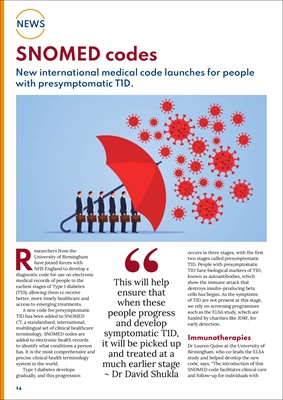
14
NEWS
This will help
ensure that
when these
people progress
and develop
symptomatic T1D,
it will be picked up
and treated at a
much earlier stage
~ Dr David Shukla
SNOMED codes
New international medical code launches for people
with presymptomatic T1D.
Researchers from the
University of Birmingham
have joined forces with
NHS England to develop a
diagnostic code for use on electronic
medical records of people in the
earliest stages of Type 1 diabetes
(T1D), allowing them to receive
better, more timely healthcare and
access to emerging treatments.
A new code for presymptomatic
T1D has been added to SNOMED
CT, a standardised, international,
multilingual set of clinical healthcare
terminology. SNOMED codes are
added to electronic health records
to identify what conditions a person
has. It is the most comprehensive and
precise clinical health terminology
system in the world.
Type 1 diabetes develops
gradually, and this progression
occurs in three stages, with the first
two stages called presymptomatic
T1D. People with presymptomatic
T1D have biological markers of T1D,
known as autoantibodies, which
show the immune attack that
destroys insulin-producing beta
cells has begun. As the symptoms
of T1D are not present at this stage,
we rely on screening programmes
such as the ELSA study, which are
funded by charities like JDRF, for
early detection.
Immunotherapies
Dr Lauren Quinn at the University of
Birmingham, who co-leads the ELSA
study and helped develop the new
code, says, "The introduction of this
SNOMED code facilitates clinical care
and follow-up for individuals with